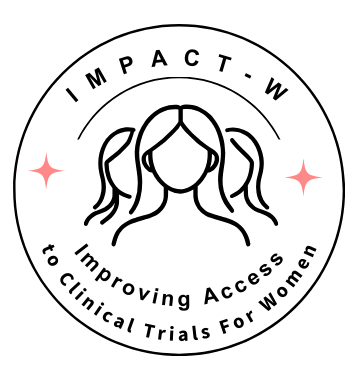
Study Design: Qualitative Study
Disease Area: General Health
Funder: NIHR
Sponsor: University of Hull
Chief Investigator: Laura Hermann
Improving Access to Clinical Trials for Women (IMPACT-W)
-
Project overview
-
Trial Team
-
Patient Information
-
Dissemination
Summary
What is the issue we are investigating?
We want to find out why not enough women take part in research as often as they should be and to develop a set of recommendations to improve this.
The reasons could be:
a) The rules for who can take part in a study mean women are left out when trials are being designed, often because it is not felt safe to test new treatments among women who have the potential to become pregnant.
b) Those recruiting people to take part in research are not asking women who are eligible.
c) Women are being asked to take part in research, but are saying no.
Why is this issue important?
Women spend more of their lives in poorer health than men, and this is getting worse. Clinical trials can help improve health, but women are often under-served in them. Clinical trials usually compare a new treatment against an existing treatment to see which is best. Being ‘under-served’ means fewer women take part in clinical trials than expected, this is worse for women with a low income. If women are under-served in trials testing new treatments, we won’t know if these treatments improve women’s health.
How will patients benefit from this research?
The recommendations will be available to anyone planning to run a clinical trial. This means that in the short term, more women will have the chance to take part in clinical trials and benefit personally. In the longer term, improving women’s representation should mean that treatments work better and improve women’s health.
What we plan to do
- Gather evidence already available to find out what prevents or discourages women from taking part in research and what methods have been tested to improve this.
- Look at how often women are asked to take part in clinical trials and interview women and people who work on clinical trials to find out whether women are asked as often as they should be, decide not to take part after being asked, or a combination of these.
- Work with women who are not research specialists and people who work on clinical trials to develop recommendations to improve women’s participation in clinical trials.
- Work with patients and staff to agree which recommendations are the most important and develop a plan to improve women’s recruitment.
Chief Investigator
Laura Hermann NIHR Doctoral Fellow - Hull Health Trials Unit
HHTU Study team
Professor Judith Cohen - Supervisor
Sarah Sumpter - Data Manager
Collaborators
Dr Maureen Twiddy Reader in Mixed Methods -Institute of Clinical and Applied Health Research (ICAHR) Methods Hub
Professor Liz Walker Professor of Health and Social Work Research - ICAHR
Helen Roberts Patient and Public Involvement Co-ordinator - ICAHR
Email address
IMPACT-W@hull.ac.uk
Read the Privacy Notice here.
What is consent?
You can learn more about what consent is in research in the videos below.
Watch this space.
How will we share our results?
We will work with Patient & Public Involvement groups to develop plain English summaries of the study findings to share with study participants. So that people who work in clinical trials can use our plan to improve women’s recruitment, we will publish our results in scientific journals, present at a conference about improving trials and share our results with people who support people who run clinical trials.
What is consent?
Watch a video below to learn what consent is in research. There is a video for the English language, Polish language and English with British Sign Language.
English Language
Polish Language
English with British Sign Language

